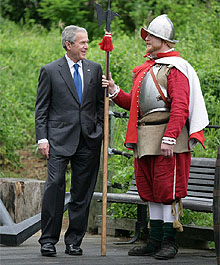Our efforts in Iraq and Afghanistan have caused more harm than good, and we have only ourselves to blame
By Peter Van Buren
Now, it’s definitive. Reconstruction in Iraq has failed. Dismally. The U.S. couldn’t even restore the country’s electric system or give a majority of its people potable water. The accounts of that failure still pour out. Choose your favorites; here are just two recent ones of mine: a report that a $200 million year-long State Department police training program had shown no results (none, nada), in part because the Iraqis had been completely uninterested in it; and a long official list of major reconstruction projects uncompleted, with billions of taxpayer dollars wasted, all carefully catalogued by the now-defunct Special Inspector for Iraq Reconstruction.
Failure, in fact, was the name of the game when it came to the American mission. Just tote up the score: the Iraqi government is moving ever closer to Iran; the U.S. occupation, which built 505 bases in the country with the thought that U.S. troops might remain garrisoned there for generations, ended without a single base in U.S. hands (none, nada); no gushers of cheap oil leapt USA-wards nor did profits from the above leap into the coffers of American oil companies; and there was a net loss of U.S. prestige and influence across the region. And that would just be the beginning of the list from hell.
By becoming versions of us, the people we conquer would, in our eyes, redeem themselves from being our enemies. Like a perverse view of rape, reconstruction, if it ever worked, would almost make it appear that they wanted to be violated by the American military so as to benefit from being rebuilt in the American fashion. From Washington’s point of view, there’s really no question here, no why at all. Who, after all, wouldn’t want to be us? And that, in turn, justifies everything. Think of it as an up-to-date take on that classic line from Vietnam, “It became necessary to destroy the town to save it.”
Americans have always worn their imperialism uncomfortably, even when pursuing it robustly. The British were happy to carve out little green enclaves of home, and to tame—brutally, if necessary—the people they conquered. The United States is different, maybe because of the lip service politicians need to pay to our founding ideals of democracy and free choice.
We’re not content merely to tame people; we want to change them, too, and make them want it as well. Fundamentalist Muslims will send their girls to school, a society dominated by religion will embrace consumerism, and age-old tribal leaders will give way to (U.S.-friendly, media-savvy) politicians, even while we grow our archipelago of military bases and our corporations make out like bandits. It’s our way of reconciling Freedom and Empire, the American Way. Only problem: it doesn’t work. Not for a second. Not at all. Nothing. Nada.
Failure in the strict sense of the word is not necessarily a problem for Washington. Our purpose is served by the appearance of reconstructing. We need to tell ourselves we tried, and those (dark, dirty, uneducated, Muslim, terrorist, heathen) people we just ran over with a tank actually screwed this up. And OK, sure, if a few well-connected contractors profit along the way, more power to them.
Heathen Indians will send their children to school, a society dominated by religion will embrace consumerism, and age-old tribal leaders will give way to (U.S.-friendly, media-savvy) politicians, even while we grow our archipelago of military bases and our corporations (railroads, mines, and ranches) make out like bandits.
Alas, some things never change. American imperialism seems to be one of them.
For more on the subject, see Indians Say "Unoccupy America" and US Policy = Seeking Terror-tory.
Below: Two conquerors who invaded foreign territory to remake the inhabitants in their image.


The piece loses on so many points, including equating the terrorists with Columbus' innocent civilian victims.
ReplyDelete